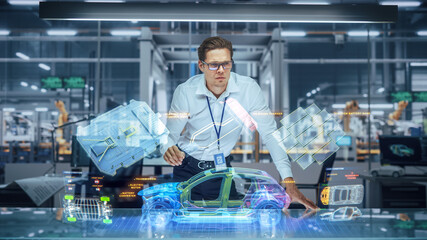Artificial Intelligence (AI) is poised to transform the automotive industry in unprecedented ways. From self-driving cars to personalized driving experiences, AI’s integration into the automotive sector promises to bring about a revolution that will reshape how we interact with vehicles. The impact of AI on the automotive industry extends beyond just the vehicles themselves; it encompasses manufacturing, safety, customer engagement, and environmental sustainability. As we look to the future, it’s clear that AI will play a pivotal role in driving the automotive industry towards a smarter, safer, and more efficient future.
Table of Contents
ToggleAutonomous Driving
One of the most talked-about applications of AI in the automotive industry is autonomous driving. Self-driving cars, once a concept confined to science fiction, are now becoming a reality. AI algorithms, coupled with sensors, cameras, and radar systems, enable vehicles to perceive their environment, make decisions, and navigate roads with minimal human intervention.
The potential of autonomous vehicles (AVs) is immense. Experts predict that by 2030, self-driving cars could account for 10-15% of new car sales. This shift will not only revolutionize the way we travel but also have profound implications for road safety, traffic management, and urban planning. AI-driven autonomous vehicles promise to reduce accidents caused by human error, improve traffic flow, and provide mobility solutions for those unable to drive, such as the elderly and disabled.
However, the journey towards fully autonomous vehicles is not without challenges. The development and deployment of AVs require robust AI systems capable of handling complex driving scenarios, such as navigating through busy city streets or responding to unexpected road conditions. Furthermore, the regulatory and ethical implications of self-driving cars must be carefully considered to ensure their safe integration into society.
Advanced Safety Features
Safety is paramount in the automotive industry, and AI is set to enhance vehicle safety in ways previously unimaginable. Advanced Driver Assistance Systems (ADAS), powered by AI, are already making cars smarter and safer. These systems use AI to detect and respond to potential hazards on the road, helping to prevent accidents and save lives.
One of the key applications of AI in vehicle safety is obstacle detection and collision avoidance. AI-powered sensors and cameras can identify obstacles in the vehicle’s path and trigger automatic braking or steering adjustments to avoid collisions. This technology is particularly valuable in preventing accidents caused by distracted or inattentive driving.
Another critical area where AI is making a difference is in monitoring driver alertness. AI systems can analyze data from sensors that track the driver’s eye movements, facial expressions, and heart rate to detect signs of fatigue or drowsiness. If the system detects that the driver is not paying attention or is at risk of falling asleep, it can issue warnings or even take corrective action, such as slowing down the vehicle or bringing it to a safe stop.
These advanced safety features are not just limited to luxury vehicles; they are increasingly becoming standard in a wide range of cars, making driving safer for everyone on the road.
Predictive Maintenance
Predictive maintenance is another area where AI is set to have a significant impact on the automotive industry. Traditional vehicle maintenance often relies on scheduled service intervals or reactive repairs when something goes wrong. However, AI-driven predictive maintenance takes a more proactive approach, using data and machine learning algorithms to predict when a vehicle component is likely to fail and needs maintenance.
By analyzing data from sensors embedded in the vehicle, AI can monitor the health of various components, such as the engine, transmission, brakes, and tires. When the AI detects that a part is wearing out or is likely to fail soon, it can alert the driver or the service center, allowing for timely repairs before a breakdown occurs. This approach not only helps to prevent costly repairs but also reduces the risk of unexpected breakdowns and enhances vehicle reliability.
Predictive maintenance also benefits repair shops and dealerships by helping them manage their parts inventory more effectively. AI can predict which parts are likely to be in demand based on the condition of vehicles in the area and adjust inventory levels accordingly. This reduces the risk of parts shortages and ensures that repairs can be completed quickly and efficiently, minimizing downtime for the vehicle owner.
Sustainable Practices
As concerns about climate change and environmental sustainability grow, the automotive industry is under increasing pressure to reduce its carbon footprint. AI has the potential to play a crucial role in making vehicles more environmentally friendly and driving the industry towards a greener future.
One of the ways AI can contribute to sustainability is through the optimization of vehicle energy consumption. AI algorithms can analyze driving patterns and environmental conditions to optimize fuel efficiency and reduce emissions. For example, AI can adjust the engine’s performance based on real-time data, such as traffic conditions and terrain, to minimize fuel consumption. Additionally, AI can optimize the operation of electric vehicles (EVs) by managing battery usage and charging cycles to extend the battery’s lifespan and improve overall energy efficiency.
AI can also play a role in the development of new materials and manufacturing processes that are more environmentally friendly. By analyzing data from the production line, AI can identify areas where energy consumption can be reduced, waste can be minimized, and recycling can be improved. This not only helps to reduce the environmental impact of vehicle manufacturing but also lowers production costs, making sustainable practices more economically viable.
Moreover, AI-driven technologies can support the development of autonomous electric vehicles, which have the potential to significantly reduce greenhouse gas emissions. By combining the benefits of autonomous driving with the environmental advantages of electric vehicles, AI can help pave the way for a future where transportation is both sustainable and efficient.
Personalized Driving Experience
The future of AI in the automotive industry is not just about making cars smarter and more efficient; it’s also about creating a more personalized driving experience. AI has the potential to tailor the driving experience to individual preferences, making each journey more enjoyable and comfortable.
One of the ways AI can achieve this is through adaptive learning. By analyzing data from the driver’s behavior, preferences, and interactions with the vehicle, AI can learn to anticipate the driver’s needs and preferences. For example, AI can adjust the seat position, climate control, and entertainment options based on the driver’s past choices. It can also suggest routes and driving modes that align with the driver’s preferences, such as selecting the fastest route for a time-conscious driver or the most scenic route for a leisure trip.
AI can also enhance the in-car experience by integrating with other smart devices and services. For instance, AI can sync with the driver’s smartphone to provide personalized music playlists, navigation assistance, and even restaurant recommendations based on the driver’s location and preferences. Additionally, AI can provide real-time traffic updates and suggest alternative routes to avoid congestion, making the driving experience smoother and more convenient.
As AI continues to evolve, the possibilities for personalization in the automotive industry are virtually limitless. In the future, cars may become more like personal assistants, seamlessly integrating with our daily lives and adapting to our unique preferences and needs.
Improved Production
AI is not only transforming the way we drive but also revolutionizing the way vehicles are manufactured. The integration of AI into the production process is helping automotive companies maximize efficiency, reduce errors, and improve overall productivity.
One of the key applications of AI in manufacturing is in production line automation. AI-powered robots and machines can perform tasks with precision and consistency, reducing the risk of human error and increasing the speed of production. For example, AI can be used to automate the assembly of complex vehicle components, such as engines and transmissions, ensuring that each part is assembled to exact specifications.
AI can also be used to optimize the production process by analyzing data from the assembly line. By identifying bottlenecks and inefficiencies, AI can suggest adjustments to improve workflow and reduce production time. Additionally, AI can assist with quality control by detecting defects and anomalies in real-time, ensuring that only high-quality vehicles leave the production line.
Another area where AI is making a difference is in the management of production line checklists, inspections, and standard operating procedures. Speech-enabled AI technology can guide workers through these tasks, ensuring that all steps are followed correctly and consistently. This not only helps to maximize safety but also reduces the likelihood of errors that could lead to costly recalls or rework.
As AI continues to advance, its role in automotive manufacturing will only grow, leading to more efficient and cost-effective production processes.
Better Customer Data
In the competitive automotive industry, understanding and engaging with customers is key to success. AI has the potential to revolutionize the way automotive companies interact with their customers by consolidating data from multiple sources into a single, comprehensive database.
AI-driven customer relationship management (CRM) systems can analyze data from various touchpoints, such as dealership visits, online interactions, and vehicle telematics, to create a detailed profile of each customer. This allows automotive companies to better understand their customers’ preferences, needs, and behaviors, enabling them to offer more personalized and targeted services.
For example, AI can analyze a customer’s driving patterns and vehicle usage to recommend maintenance services or suggest a new vehicle that aligns with their needs. AI can also help automotive companies anticipate customer needs and proactively offer solutions, such as scheduling a service appointment before a problem arises or providing a special offer on a new vehicle.
Furthermore, AI can enhance customer engagement by providing personalized communication and support. AI-powered chatbots and virtual assistants can handle customer inquiries and provide real-time assistance, improving response times and customer satisfaction. By leveraging AI to enhance customer engagement, automotive companies can build stronger relationships with their customers and foster brand loyalty.
Wrapping Up
The future of AI in the automotive industry is bright, with the potential to revolutionize every aspect of the industry, from driving and safety to manufacturing and customer engagement. As AI continues to evolve, it will enable the automotive industry to create smarter, safer, and more personalized vehicles that meet the needs of consumers and society as a whole.
FAQs
Q1: How is AI expected to impact the future of the automotive industry?
AI is set to revolutionize the automotive industry by making cars safer, more efficient, and more personalized. Key areas of impact include autonomous driving, advanced safety features, predictive maintenance, sustainable practices, and improved production processes.
Q2: What role will AI play in autonomous driving?
AI will be crucial in the development of autonomous vehicles, enabling cars to navigate roads with minimal human intervention. AI systems will process data from sensors and cameras to make real-time decisions, which is essential for the safe and efficient operation of self-driving cars.
Q3: How can AI improve vehicle safety?
AI enhances vehicle safety through advanced driver assistance systems (ADAS). These systems use AI to detect potential hazards, such as obstacles or sudden changes in traffic, and can automatically take actions like braking to prevent accidents. AI can also monitor driver alertness and issue warnings or take corrective measures if necessary.
Q4: What is predictive maintenance, and how does AI contribute to it?
Predictive maintenance involves using AI to analyze data from vehicle sensors to predict when a part might fail. This allows for timely repairs before a breakdown occurs, reducing unexpected maintenance costs and improving vehicle reliability.
Q5: In what ways can AI promote sustainability in the automotive industry?
AI contributes to sustainability by optimizing energy consumption in vehicles, reducing emissions, and improving manufacturing processes to minimize waste. Additionally, AI can support the development of more efficient electric vehicles, which have a lower environmental impact.
Q6: How can AI personalize the driving experience?
AI can learn from a driver’s behavior and preferences to tailor the driving experience. This includes adjusting seat settings, climate control, and entertainment options, as well as suggesting preferred routes based on past choices.
Q7: What improvements can AI bring to automotive manufacturing?
AI can significantly improve production efficiency by automating tasks on the assembly line, reducing errors, and enhancing quality control. AI-driven analysis can also optimize the production process by identifying and addressing bottlenecks.
Q8: How will AI help automotive companies understand their customers better?
AI enables automotive companies to consolidate customer data from various sources, creating a detailed profile of each customer. This allows companies to offer more personalized services, anticipate customer needs, and improve overall customer satisfaction.
Q9: Are there any challenges to integrating AI into the automotive industry?
Yes, while AI offers numerous benefits, integrating it into the automotive industry presents challenges, including ensuring the reliability of AI systems, addressing ethical and regulatory concerns, and managing the significant costs associated with AI development and deployment.
Q10: What does the future hold for AI in the automotive industry?
The future of AI in the automotive industry is promising, with ongoing advancements likely to lead to smarter, safer, and more efficient vehicles. As AI technology evolves, it will continue to play a key role in shaping the future of transportation.














2 thoughts on “The Future of AI in the Automotive Industry: Safety, Efficiency, and Personalization”